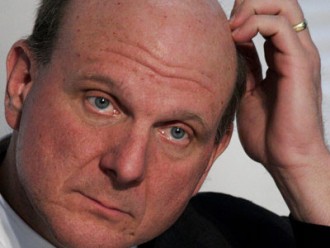 Now that Steve Ballmer is on his way out, partners are breathing a collective sigh of relief for a number of reasons, some petty some huge. Over the last 13 years Microsoft has had a fair share of ups and downs. Although Ballmer can and should be blamed for many of them, it is worth taking a step back for a bit of perspective.
Now that Steve Ballmer is on his way out, partners are breathing a collective sigh of relief for a number of reasons, some petty some huge. Over the last 13 years Microsoft has had a fair share of ups and downs. Although Ballmer can and should be blamed for many of them, it is worth taking a step back for a bit of perspective.
He took the helm in the good old days, when work was already underway on XP, one of Redmond’s most successful operating systems, backed by an impressive array of other products and initiatives, such as the Xbox push.
It’s been downhill ever since.
Ballmer described Vista as his biggest regret and who are we to argue. Vista was terrible, but in an ironic twist it did help fuel the need for new, faster hardware. It was just too bloated to run properly on old XP boxes, so people had to upgrade. To fix the mess Windows 7 was a lot more streamlined and it was followed up by the even leaner Windows 8. As a result, most Vista machines are still perfectly capable of running the latest version of Windows and the biggest reason to upgrade a laptop is an unfortunately placed cup of tea coupled with long sleeves.
However, the biggest problem with Windows was and still remains relatively slow development and the reliance on an ancient business model that no longer works. Apple and Google try to keep things interesting with tons of updates and new features, free of charge. Microsoft’s updates are basically fixes and new versions of Windows still cost an arm and a leg, offering very little in return. Windows 8 is proof that Microsoft still doesn’t get it. It was supposed to work on tablets, but there aren’t any, it was supposed to deliver x86 hybrids which are still nowhere to be found and it was supposed to do all that with very little in the way of touch enabled apps. As an added bonus, corporate users hate the new interface, which has failed on both fronts. Windows 8 is not good for tablets, but the tablet tweaks also made it unappealing for desktop users and businesses.
There was no shortage of hardware flops during Ballmer’s tenure, either. Remember the Zune, or better yet the Kin? Neither do we and Microsoft is trying to forget them. In addition to wasting millions on Zune, Microsoft also wasted half a billion on the developer of Sidekick and Kin, which was appropriately named Danger. Microsoft’s hardware curse is still going strong, thanks to the Surface RT.
Investing in Danger wasn’t the only bad call. Six years ago Microsoft also took a $6.2 billion write down for digital marketing outfit aQuantive. Wasteful spending continued with Microsoft’s efforts to take on Google in online services and search. All the efforts failed spectacularly, but cumulatively they cost the company a few more billion. Earlier this year Microsoft took another $900 million hit thanks to the Surface RT.
While Ballmer’s Microsoft was trying to compete with Google online, it was outmanoeuvred by Google on its own turf. Google acquired Android eight years ago for just $50 million, one tenth of what Microsoft paid for Danger. Google is now the biggest mobile OS on the planet, the Kin is just another embarrassing footnote in Microsoft’s history. Google also scooped up YouTube, DoubleClick, AdMob and topped it all off with Motorola Mobility. Google was just a lot better at picking winners than Ballmer and his gang. Microsoft did get Skype, but it paid $8.5 billion for the privilege and it did it only after Skype virtually destroyed its own Messenger.
The Skype deal is indicative of another problem. Mighty Microsoft paid $8.5 billion to buy a competitor, as it apparently couldn’t bring its own services up to speed for what is a huge amount of cash. Google probably could and would, Apple too, but for some reason Microsoft’s culture revolves around throwing cash at problems rather than solving them in-house. It is just a weird and oppressive culture that could work in the nineties, when Microsoft was king of the world and didn’t have much competition to worry about.
But Microsoft’s biggest failure under Ballmer was undoubtedly mobile. Ballmer arrogantly laughed at the iPhone and he clearly failed to recognize the threat posed by iOS and Android. As a result Microsoft’s market share in the smartphone market is virtually non-existent. It also teamed up with Nokia, another outfit that didn’t get it, which was only fitting. If phones weren’t to be, then Microsoft had another big chance in tablets, but it botched that, too. It even decided to cripple its own Windows RT by refusing to integrate Outlook, while at the same time it refused to release Office for iOS and Android, which didn’t help its own products and just allowed competing products to emerge.
The big question now is who will take the helm? We’re not sure anyone was groomed for the job and to be honest we’re not sure many people would want it. We suggest a maid from a Las Vegas hotel. They are used to cleaning up a mess and cleaning up Ballmer’s mess will probably be akin to cleaning Hunter S. Thompson’s hotel room.
 Microsoft CEO Satya Nadella appears to be packing his suitcase to visit China in late September in a move which might be an attempt to sort out the government’s rejection of his company’s software.
Microsoft CEO Satya Nadella appears to be packing his suitcase to visit China in late September in a move which might be an attempt to sort out the government’s rejection of his company’s software.







